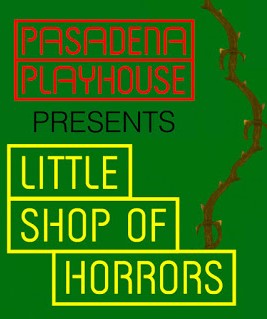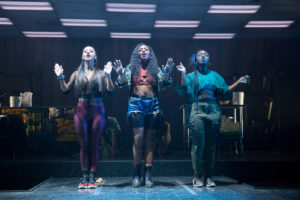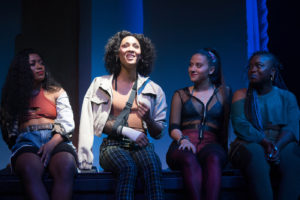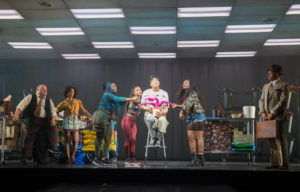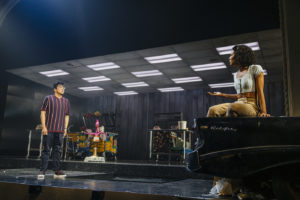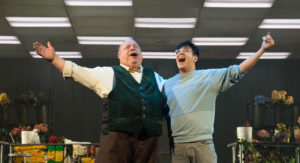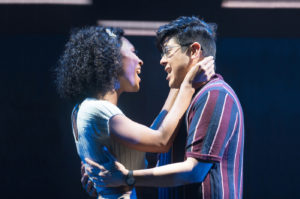A GREEN NEW DEAL
As Little Shop of Horrors teaches us: sometimes you just need fresh blood. In that vein, the Pasadena Playhouse more than delivers. Their audacious revival of the quirky cult classic – directed with exemplary vision by Mike Donahue – offers audiences something they may not have realized they craved. In this ground-up reimagining, complete with ingenious casting, we’re treated to a more representative sampling of the American story.
Little Shop is a curious hybrid — a perfect blend of science-fiction and romantic-comedy told through the stylings of a 1960s doo-wop rock musical. This strange little horror examines American Dream idealism with cynicism and a blood-soaked smile. While the have-nots struggle to attain a modest living, nature itself threatens the human race with extinction. It’s a cautionary tale about the “crime” of being poor and doing whatever it takes to escape such trappings. In an era of growing income inequality amidst a global climate crisis, it makes sense the Pasadena Playhouse would dust off this oddity to reveal its relevance.
Enter Seymour Krelborn (George Salazar), a lowly worker in a failing florist shop owned by the opportunistic Mr. Mushnik (Kevin Chamberlin). When Mushnik announces the shop’s closing, Seymour and his co-worker Audrey (Mj Rodriguez) devise a plan to save the shop – and their own butts. While out shopping for merchandise, Seymour recently secured a peculiar plant specimen that mysteriously appeared following a total eclipse of the sun. Maybe by putting this strange-looking oddity out front customers will flock and save the shop. Mushnik agrees. The plan is enacted, and before you know it, business is booming and the press comes a-courting. There’s just one catch. The exotic plant – lovingly named Audrey II (Amber Riley) by the Audrey-smitten Seymour — feeds on blood. Seymour chooses to keep this discovery a secret, privately feeding the plant from his pricked fingertips. But when Audrey II’s appetite grows, so do the stakes, and Seymour is faced with moral dilemmas of the most morbid kind.
Written by Howard Ashman (book and lyrics) and Alan Menken (music) — later known for their work on Disney’s The Little Mermaid, Beauty and the Beast, and Aladdin — the musical based on the 1960s comedic film premiered Off-Off-Broadway in 1982. It then headed to Off-Broadway and Broadway, before spreading like killer plants to theaters worldwide, including a star-studded big screen adaptation in 1986.
While Little Shop’s themes remain timely, the times have changed, and so has the face of America. Instead of following in the footsteps of tradition, Donahue casts the story’s marginalized characters not as straight-laced and lily white but instead a more honest reflection of current America: a full spectrum of color, sexuality, gender identity, and class. Some may call the Playhouse’s casting “brave” and “bold.” It is. But more importantly, it’s truthful — and refreshing. It’s incredibly powerful in our modern era to see our social-castaway leading players (Seymour and Audrey) portrayed by people of color — one an out gay man, the other a transgender woman. “Skid Row (Downtown)” brings chills when the diverse company fills the stage and we hear our protagonist sing:
Someone show me a way to get outta here
’˜Cause I constantly pray I’ll get outta here
Please, won’t somebody say I’ll get outta here
Someone gimme my shot or I’ll rot here
George Salazar wears his heart on his sleeve as Seymour. He’s charmingly nerdy in the role. After witnessing his life as a continual kickdown, we’re with him to the bitter end when opportunity presents him a way out of poverty. Mj RodrÃguez is a gem as Audrey, bringing a warm humanity to a woman in an abusive relationship who dares to dream of a quiet existence far away from Skid Row. Salazar’s chemistry with Rodriguez is absolutely heart-warming.
Multiple Tony Award nominee Kevin Chamberlin brings a likability and comedic charm to the unscrupulous Mr. Mushnik. Similarly, Matthew Wilkas as the sadistic dentist Dr. Orin Scrivello is deliciously maniacal. The doo-wopping “Greek Chorus” Urchins — Brittany Campbell (Ronnette), Tickwanya Jones (Chiffon), and Cheyenne Isabel Wells (Crystal) — are electrifying. With the help of choreographer Will B. Bell they serve a jiving sensibility to their vocal- and dance-heavy roles. Offstage, Amber Riley makes for a ferocious voice of Audrey II — a role usually vocalized by men. And though her talents are heard and not seen, she fills the stage with her ever-growing presence.
Not only is this production’s Audrey II vocally reimagined, puppet designer Sean Cawelti has significantly revamped the look of the creature as well. Multiple puppeteers (Tyler Bremer, Kelsey Kato, Tim Kopacz, and Paul Turbiak) provide the monster’s ever-growing “tentacles,” and creative uses of lighting, silhouettes, and curtains are employed to realize Cawelti’s vision. And while this striking new look is beautifully theatrical, it also creates confusion. Because the miniature plant is prominently displayed throughout the show, it’s not always clear whether its abstractly stylized “growth” is more figurative than literal.
The Pasadena Playhouse’s Little Shop of Horrors is a game-changer. Though Act I’s pacing drags a bit and the plot can feel clunky at times, all of that is overridden by the humanity the production unveils. By seeing an old work with new eyes, the Playhouse has elevated the camp with cultural importance, mirroring society with emotional impact. With humanity in peril, you can at least get a taste of it here before it all goes away.
 photos by Jeff Lorch and Jenny Graham
photos by Jeff Lorch and Jenny Graham
Little Shop of Horrors
Pasadena Playhouse
39 S. El Molino Ave. in Pasadena
Tues-Fri at 8; Sat at 2 & 8; Sun at 2 & 7
ends on October 20, 2019
for tickets, call 626.356.7529
or visit Pasadena Playhouse
